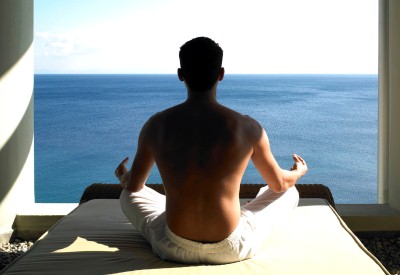Breathing and Meditation Techniques for a Healthy Heart

by Toby Maguire
A Taoist Master
The Heart is often referred to as the 'Source of Life' as it provides the body with the essential ingredients that it needs to survive. This central muscle is finely sensitive to feedback mechanisms concerning our brain and muscle oxygen needs. It pumps blood, carrying warmth, oxygen and nutrients around the body and its rate and rhythm are determined by our breathing and our mental and emotional states.
In Asia, the heart is strongly associated with emotions and in the Thai language every emotion is associated with the word "jai" or "heart". "Jai rorn" means "hot heart" or "angry", "jai dee" means "good heart" or "compassionate" and "sabai jai" means "at ease with the heart" or "relaxed". In the English language we have words such as "kind hearted", "warm heart", "heartfelt" and "heartless", all associated with feelings and emotions. When treating a client with Auricular Acupuncture for excessive emotional states such as stress, anger, fear or anxiety, the first needle is always inserted in the point that correlates to the heart.
But how can our minds and emotions affect our heart?
One example is when we experience stress. Fear and anger are the most common emotions that we feel when we are stressed, which brings about the "fight" or "flight" response in our bodies. During the stress response, the heart beats faster, the arteries constrict (increasing blood pressure) and hormones that not only increase our energy but also affect our mood, flood throughout the body. The more stress we feel, the more our blood pressure increases and the more emotional we become, which then again results in higher blood pressure and an even more excited hormonal system and a so on and son on. It becomes a vicious circle. Lack of exercise and a poor diet added to this is what has contributed to heart disease being the leading cause of death in western society.

So how can we counteract these negative emotions and reduce pressure on the heart? One way is through deep abdominal breathing, another is through meditation.
Slow, deep abdominal breathing at a rate of six breaths per minute (BPM), inhaling deeply for 5 seconds and exhaling for 5 seconds through the nose, slows down the heart rate and counteracts the stress response of the body. Thirty years of scientific research by Dr Paul Johnson at Oxford University revealed that practicing 15 minutes of deep abdominal breathing per day at 6 BPM not only reduces high blood pressure, but also calms the mind by bringing the endocrine system (hormone releasing glands), back into a state of homeostasis.
Learning some simple meditation techniques also allows us to deal with our emotions more effectively. By learning to observe the mind and detach ourselves from our thoughts cuts off our body's hormonal response to them. This can be done whilst practising the abdominal breathing by keeping the mind focused on the breath. Just observe the sensation of the breath moving in and out of the body and observe the abdomen rising and falling. Every time a thought comes to mind, just observe it for a few seconds, let the thought go and gently bring the mind back to the breath. It is only when we cling to our thoughts and let our minds drift away and follow them that we trigger a hormonal response and increase stress on the heart. But by continually letting the thoughts go, the heart rate drops, the glands stop releasing excessive hormones and the body and mind reaches a state of peace and equilibrium.
